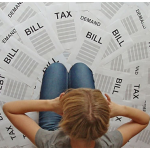 Are you unable to pay your bills? You may be able to get a “Fresh Start” by filing Bankruptcy. Explain your situation to me, and I will advise you whether Bankruptcy may be an option for you.
Are you unable to pay your bills? You may be able to get a “Fresh Start” by filing Bankruptcy. Explain your situation to me, and I will advise you whether Bankruptcy may be an option for you.
BANKRUPTCYU.S. BANKRUPTCY COURTS – Each federal district court has a bankruptcy unit that hears and decides petitions of individuals and businesses seeking relief from bankruptcy. Under the federal bankruptcy code, there are four categories of such cases. There are three main types of bankruptcy cases. These are referred to by their chapter number in the Bankruptcy Code.
People who are having trouble paying their debts sometimes consider bankruptcy as a remedy for this situation. An individual, called a debtor, usually files bankruptcy to obtain a discharge, which will wipe out his or her debts so that they will not have to be paid. Once the bankruptcy begins, creditors cannot try to collect discharged debts from the bankruptcy debtor or sue the debtor to obtain a judgment. With a few exceptions, the creditors have no claim on the debtor’s future income or future assets. HOW DO I FILE A BANKRUPTCY PETITION? DO I NEED A LAWYER? Some debtors use non-lawyer bankruptcy petition of filing services to complete the schedules and documents which must be filed with the bankruptcy petition. While this may cost less initially than consulting an attorney, these non-lawyer services by law cannot give legal advice or represent the debtor in the Bankruptcy Court. If a problem arises, they will not be able to help you in court. If you are contemplating a Chapter 11 or Chapter 13 case, then the need to be represented by an attorney is even greater. Certain complexities in the law make it extremely difficult for a debtor to successfully conclude a Chapter 11 or Chapter 13 case without the assistance of an attorney. A corporation cannot represent itself in a bankruptcy case and must be represented by an attorney. Ask Clifford J. Geismar P.A about his experience. |
